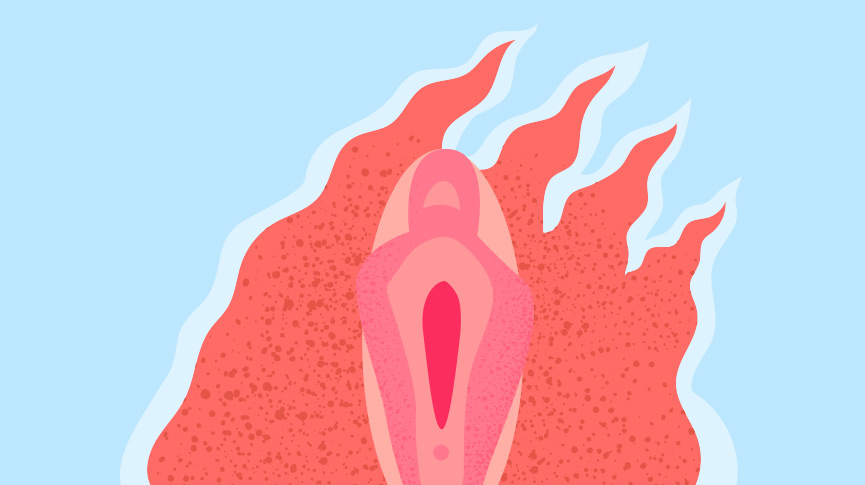Vaginal dryness treatment: don’t just live with dryness

Vaginal dryness will likely affect every woman at some point in their lives – it’s extremely common and nothing to be embarrassed about! The main cause of vaginal dryness is decreased estrogen levels, which can happen when you’re breastfeeding, during menopause or during any other time where there is a change in your hormone levels. Less estrogen can cause your vaginal tissues to become thinner and less elastic, and results in reduced vaginal moisture. This also makes it easier for your vaginal tissue to become irritated, resulting in itching or burning around your genitals and even increased infections. Don’t worry though, there are ways of treating feminine dryness and even preventing future episodes to give you the best intimate health possible.
What to do about dryness?
Like anything associated with your intimate health, the first thing you should do is go see your doctor. Aside from menopause and childbirth, other factors can cause vaginal dryness, like some allergy or cold medications, antidepressants, and even certain autoimmune disorders. Your doctor can rule out these other causes and recommend the remedy that’s best for you. You can find out more about what causes vaginal dryness in our full article here.
Invest in a Good Vaginal Moisturizer
For immediate relief from your symptoms you can apply a safe, water-based vaginal moisturizer. These products imitate your vagina’s natural moisture and can relieve your symptoms. Make sure the product you use is pH-balanced so you don’t upset your body’s natural equilibrium.
Estrogen Treatment
The most common long-term treatment for feminine dryness is estrogen therapy, which supplements your natural hormone levels and must be overseen by a doctor. For vaginal dryness, a topical estrogen (a cream, ring, or tablet applied to the vagina directly) is generally most effective. If you’re experiencing other symptoms of low estrogen, like hot flashes or night sweats during menopause, your doctor might prescribe you systemic hormones (like oral pills or skin patches).
However, some estrogen therapies have been linked to certain negative side effects, from headaches and nausea to increased risk of cancer and blood clots, so be sure to discuss all options with your doctor to decide if hormones are right for you.
Keep Your Pelvic Floor in Peak Shape
Your vagina and other internal organs are supported by your pelvic floor muscles. Healthy pelvic floor muscles are good for your intimate health for a variety of reasons, but falling estrogen levels cause them to become weaker. The good news is that there are simple exercises you can do to help them get back in shape: Kegel exercises. Kegels can help strengthen your pelvic floor muscles and improve blood flow to your vaginal tissues, which can also increase lubrication and moisture.
However, it’s essential to make sure you’re doing Kegels properly to reap the full benefits. A smart Kegel exerciser that guides you through each session can help ensure that you’re doing the exercise correctly, and even tracks your progress to help you stay motivated. It’s the best way to ensure that you’re getting the most out of every Kegel.
Going All-Natural
There are also a number of herbal supplements that have been found to treat vaginal dryness. Isoflavones, or phytoestrogens, like those found in fennel, ginseng, flax seeds and many soy products can affect the body in a similar way to estrogen – though the effect is weaker. It’s also thought that vitamin C, parsley and anise, as well as oils like tea tree and lavender extract, help to ease discomfort. Incorporating these ingredients into your diet may give you some relief from symptoms, but research has yet to determine the ideal dose or source.
Vitamin E suppositories or cosmetic grade oils such as coconut, almond or olive oil may also reduce your symptoms when they are applied locally. Although some also say that black cohosh and wild yam supplements will alleviate your symptoms there is no research evidence that indicate whether these actually work.
Always talk to your doctor before changing your diet or starting supplements.
What will make vaginal dryness worse?
Although it may be tempting, avoid using douches, bubble baths or bath oils, and don’t apply hand lotions on your vulva or inside your vagina. You should also stay away from antibacterial or scented soaps – in fact, avoid using perfumed or scented products altogether, including detergents and scented toilet paper. These products can actually irritate your vagina further and make symptoms worse.
Whatever treatment you choose, it’s important to remember that vaginal dryness is completely normal and nothing to be embarrassed about. Just be open with your doctor about the issues you’re having so you can find a solution that works for you. There is no reason to suffer through discomfort and the faster you start treating dryness the faster you can move on with your life.
Please note that advice offered by Intimina may not be relevant to your individual case. For specific concerns regarding your health, always consult your physician or other licensed medical practitioners.

A collective group of “lady experts” at Intimina who love sharing our personal experiences, even when they are a little too personal. We believe it’s time to start breaking down the taboos around menstruation, motherhood, and menopause, and start owning our female health.


